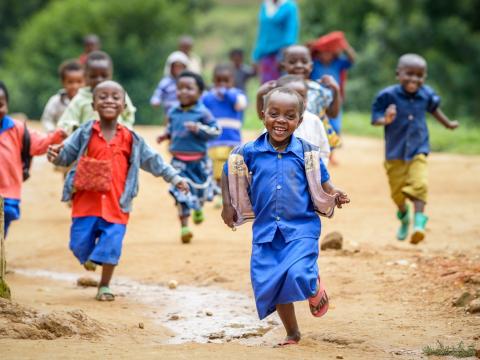Building a Brighter Future 25 Years On

Building Brighter Futures 25 Years On
As we celebrate our 25th anniversary working in Rwanda, we also celebrate the partnerships and collaborations along the way.
If you were to ask anyone who has recently visited Rwanda to tell you about their trip, they are most likely going to mention that it’s a very clean country, that the people are delightful, and that it’s one of the safest countries in Africa, with very low crime rates. For those who are familiar with the events that took place in April of 1994, it is unimaginable how Rwanda has made such a remarkable turnaround.
On 6 April 1994, an airplane carrying the then-president of Rwanda and his Burundian counterpart was shot down. Shortly after, this event sparked mass killings all across Rwanda. Thousands of people were killed in their own homes by their neighbours, whom they had considered friends and interacted with on a daily basis. Others were slain in places that are considered sanctuaries, such as churches, hospitals and schools. By July 1994 over 800,000 Tutsis and moderate Hutus had been slaughtered and millions of others were displaced. The country was devastated; survivors were physically and psychologically damaged. Families were decimated, their homes and communities destroyed. Up to 2 million people fled the country, including many of the perpetrators. Over a million people were displaced within the country. And, of the survivors, tens of thousands were children who had lost one or both parents.
The mass killing stopped when the Rwandan Patriotic Front, an army of Tutsis and moderate Hutus (led by current President Paul Kagame), seized the capital and took power in July 1994. Since the dark days of civil war and genocide, Rwanda has made much progress in terms of its development.
You’ve heard the old proverb rising tides lifts all boats? The core concept of this still rings true – at World Vision Rwanda we believe that working with the Government, churches, businesses, community-based organizations and other NGOs is beneficial to our cause of focusing on the vulnerable. As World Vision celebrates 25 years of work in Rwanda this year, we reflect on our heritage of working in partnership with others to improve the well-being of children, especially the most vulnerable.
Our work in Rwanda started in 1994, focusing first-and-foremost on relief and rehabilitation. Close to 3 million people (most of whom were children) were in urgent need of food and shelter. In order to mobilize and unify communities to build durable peace, World Vision Rwanda sought to help traumatized youth experience healing by sharing peace messages through expressions of drama, song, dance and other artistic channels. More recently, we have focused on and continue to celebrate long-term, child-focused area development programmes in different parts of the country; –these programmes, target vulnerable children and their families with interventions in the areas of education, health and nutrition; water, sanitation and hygiene; as well as the economic empowerment of households. Working jointly with the Government of Rwanda and several partners has enabled us to reach more than 1.5 million beneficiaries.
Our partnerships and collaboration have, for a quarter of a century now, led to achieving greater impact than we could have generated on our own. On March 8, 2019, World Vision staff from Rwanda along with other young peace-builders attended a caucus hosted by the European Commission and One Young World in Kigali; in which they discussed the important role that partnerships played in Rwanda’s post-genocide restoration efforts. In the years following the 1994 Genocide against the Tutsi, our teams in Rwanda strived to strategically and effectively integrate peace-building into our relief and development work. We developed the Promotion of Reconciliation among Youth (PRAY) programme. Not only did the PRAY programme influence communities to embrace the values and implications of peace, but young participants were able to find restoration in understanding their capacity, roles and responsibilities as agents of peace in their communities. In Rwanda, World Vision was recognized for this initiative in 2009.
The aim of this month’s peace-building caucus was to bring together the most impactful peace-builders under the age of 30 and accelerate their efforts in preventing and countering violent extremism, building peace, and promoting conflict resolution. Over the last two years, this initiative has gathered 120 young leaders constructing lasting peace in 97 countries.
At the event, World Vision in Rwanda was represented by Patrick Sebagabo, our Strategy & Programme Effectiveness Director and Daniel Ledama, our Faith & Development Specialist. Together, they shared about building brighter futures through partnerships, noting that they are a powerful driver in addressing poverty issues and that no single organization can eradicate poverty alone. Also emphasized was our desire to see children enjoy good health and education, experience the love of God and their neighbours, and be cared for, protected and participating – all of which we continuously strive to ensure across our programming.
“We work to create brighter futures for the children of today by strengthening education systems and communities so that children are reading with comprehension by the end of Grade 3. Our desire is that these children become lifelong learners and mature into adults capable of fostering an intergenerational transfer of the value of reading and education,” explained Patrick Sebagabo.
The 25th commemoration of the 1994 Genocide against the Tutsi is approaching next month. After overcoming tragedy, today, through restored relationships, we see communities working together, helping each other so that their lives and futures are filled with hope, promise and well-being and we seek transformed relationships as an expression of God’s unconditional love.
Over the years, partnerships have been key to helping us and others like us combat poverty, injustice and discrimination and have enabled us to continue to empower communities, families, and children; and children themselves to live their lives to the fullest. Today, a quarter of a century later, partnerships still continue to be the key to building brighter futures for especially those living in vulnerability.
..